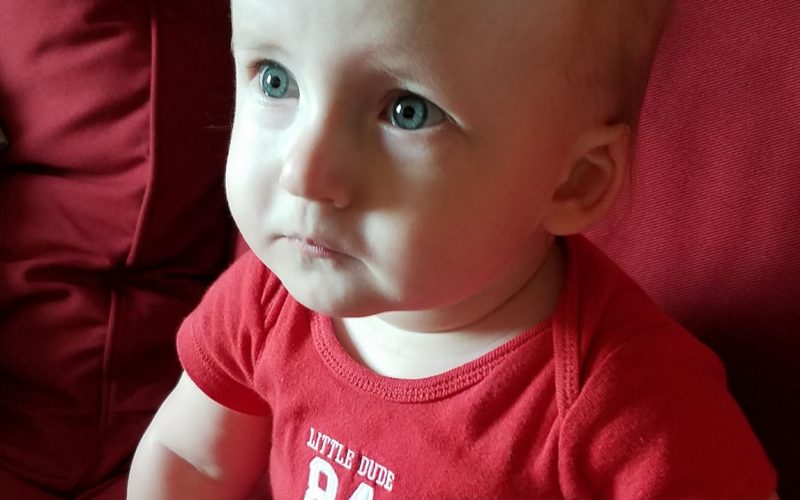Stephen and Maura Caldwell both use the phrase “things I can’t unsee.” When their son William was diagnosed with heart issues before he was born, the Caldwells — both musicians and music teachers — entered a world they’d never even imagined. They saw their son turn blue because his heart wasn’t pumping properly. They saw him come out of open heart surgery battered and bloody. And they saw other parents in the cardiac ICU deal with the loss of their babies.
They’re still living in a world they never expected, but it’s easier now. Now it’s seven days a week of physical, occupational, speech and feeding therapies. It’s helping William, who is 19 months old, learn to eat by mouth instead of being fed through a tube into his stomach. It’s knowing he faces more surgeries and being ever vigilant for telltale signs that his heart might not be functioning properly. But it’s also watching proudly as he coos and gurgles and tries to talk, as he takes his first steps, as he bangs on the piano and laughs.
Heart defects are the most common of all birth defects, affecting one in every 100 children, says Stephen Caldwell, who is director of choral activities at the University of Arkansas. “Some of them don’t need any surgeries at all, and other kids are born with defects that are incompatible with life,” he says. Not only did he find very few people were aware of issues like William’s, but even fewer realized what his birth might mean to his parents.
“That’s the untold story,” he says. “Parents get very little support — emotional, financial, whatever. I thought it was important to tell some of William’s story from that perspective.”
As a composer, Caldwell naturally turned to music. The result — almost a year in the making — is “Pre-Existing Condition,” debuting March 15 with the voices of the UA’s premiere vocal group, Schola Cantorum, along with students on piano, flute, marimba, vibraphone/glockenspiel and drum. Spending the summer of 2017 writing it was, he says, “cathartic.”
“Now that’s he stable and healthy and growing and developing, now I can look back and kind of comment and tell the story for my own sake,” he says. “At the time, we didn’t have the choice to be a wreck. I was trying to keep my job. He was in Little Rock in the hospital for months. Maura was with him. I was commuting almost daily — and trying to maintain our house and feed the cat and grade these papers — and now I can talk about that — about the anger and the fear and the frustration. It certainly was a way to have dealt with some of those emotions — but not something I could have written at the time.”
William’s story started in the seventh month of pregnancy as “the quintessential prenatal ultrasound where everybody was chatting and everything was routine — and then the technician got very quiet,” Caldwell remembers. The next day, he and Maura were at a specialist, and the next day at another specialist — where the nurse followed the doctor in with a box of tissues — then in Little Rock, where William was diagnosed with Tetralogy of Fallot, a cluster of four heart defects. When he was born at Children’s Hospital in Philadelphia — the area both Stephen and Maura are from — he was whisked away immediately and diagnosed with not four but seven heart issues.
Caldwell’s composition starts with that moment during the ultrasound when they knew something was horribly wrong and includes movements about all the medical terminology they didn’t understand, the roller coaster ride of the next few months and the “Scars” — both the physical ones William has and the emotional ones his parents never expected.
“I never imagined a heart ward for babies,” Maura Caldwell says, “let alone one in every big city in every state. One in 100 babies. That’s a lot of babies going through this — and they have all sorts of different abilities and disabilities and developmental delays. Once you’re in that world, there’s no unseeing it. And I had no idea it even existed.”
“I hope listeners can kind of experience that journey and find in it a greater compassion,” Stephen concludes.
FAQ
‘Pre-Existing Condition”
WHEN — 7:30 p.m. March 15
WHERE — Faulkner Performing Arts Center at the University of Arkansas in Fayetteville
COST — $5-$10
INFO — 575-5387
BONUS — The program also includes works for choir by Peter Schickele, G.P. Palestrina, Thomas Weelkes, William Walton, Peter de Mets and Moses Hogan.



